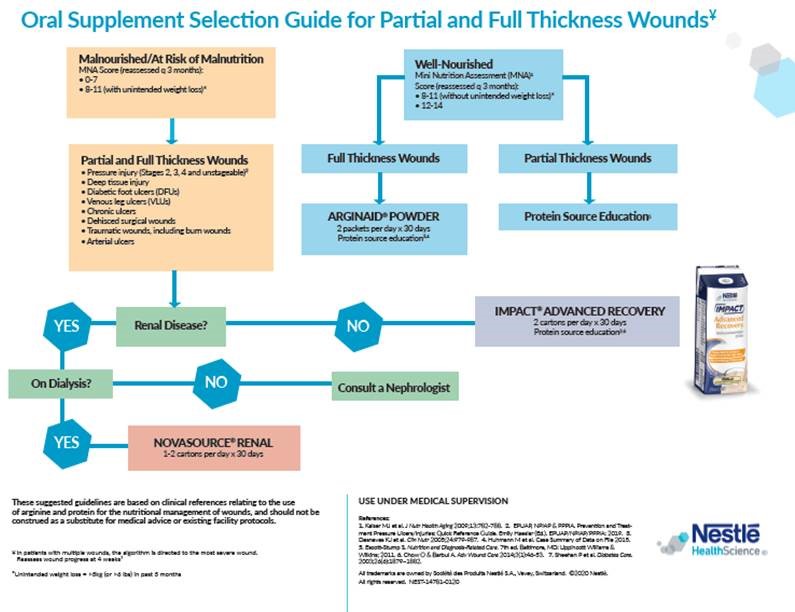I have previously discussed the fact that my electronic health record (EHR) incorporated the Nestle Mini Nutritional Assessment (MNA) so that it only takes me a few seconds to do a proper nutritional screen and it can be done while I’m in the room with the patient.
The MNA gives me a score from 0-14, which represents either a normal nutritional status (12-14 points), a patient who is at risk for malnutrition (8-11 points), or a patient who is likely malnourished (0-7 points). You would be amazed at how often patients with chronic wounds get a score between 0 and 7!
It’s all very well and good to get a score, but what am I supposed to DO with that number? Clinical guidelines say that I need to consult a registered dietician, and I agree! The problem is that I’m in a busy outpatient department and most of these patients do not have diabetes, so insurance doesn’t cover the cost of seeing a dietician. In an imperfect world, how can I use the MNA score to make some reasonable recommendation for these patients?
I asked for help from Nestle and they gave it to me! They said that I could share the algorithm we came up with, which is evidence-based. So, I’ve provided it. Above is the Oral Supplement Selection Guide for Partial and Full Thickness Wounds. This is part of my “secret sauce” in caring for patients with chronic non-healing wounds and ulcers.
I actually recommend Arginaid for all patients with non-healing wounds, regardless of their MNA score. I use the MNA score to decide whether they are also recommended to take IMPACT Advanced Recovery or Novasource Renal (if they are on dialysis).
Yes, I know this algorithm is simple. In fact, I call it my “simple girl” guide to oral nutritional supplementation (ONS). I also counsel patients on how to improve their diet (yes, I take time to ask them what they typically eat at breakfast, lunch and dinner) and I check their Vitamin D-OH level.
This approach may not be fancy, but it’s helping to get wounds healed. It’s also easy for me to do, it’s fast, and it’s evidence-based. This is how I use the MNA score to create reasonable recommendations for oral nutritional supplementation.
Additional Resources:
- More information on the CMS-approved quality measure on nutritional assessment of patients with wounds
- Here are my previous articles on this project
- A discussion of Vitamin D in wound healing

Dr. Fife is a world renowned wound care physician dedicated to improving patient outcomes through quality driven care. Please visit my blog at CarolineFifeMD.com and my Youtube channel at https://www.youtube.com/c/carolinefifemd/videos
The opinions, comments, and content expressed or implied in my statements are solely my own and do not necessarily reflect the position or views of Intellicure or any of the boards on which I serve.



